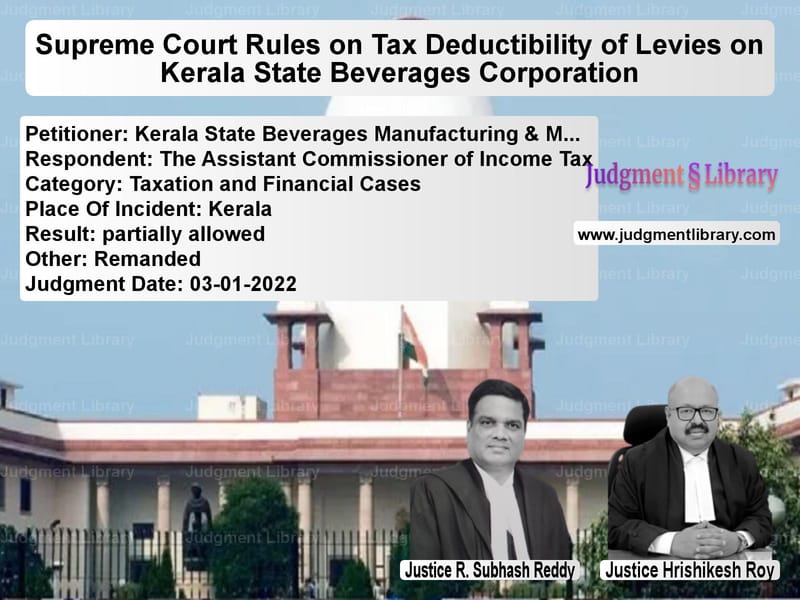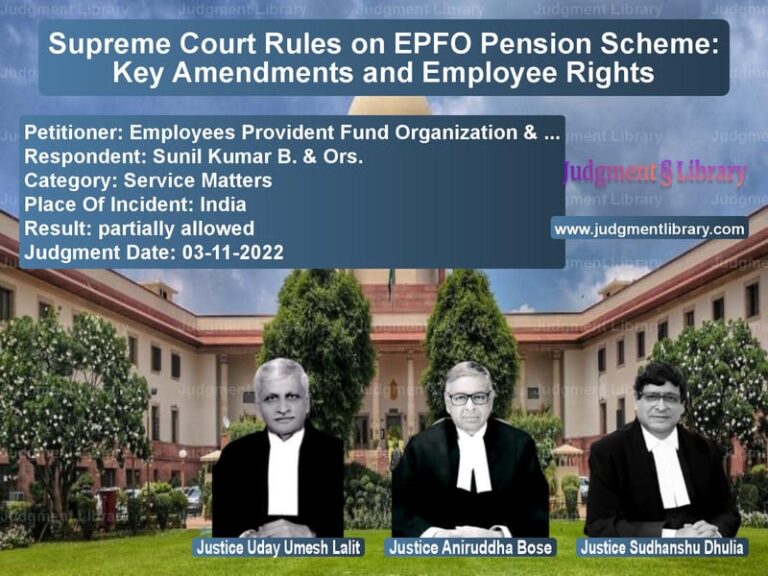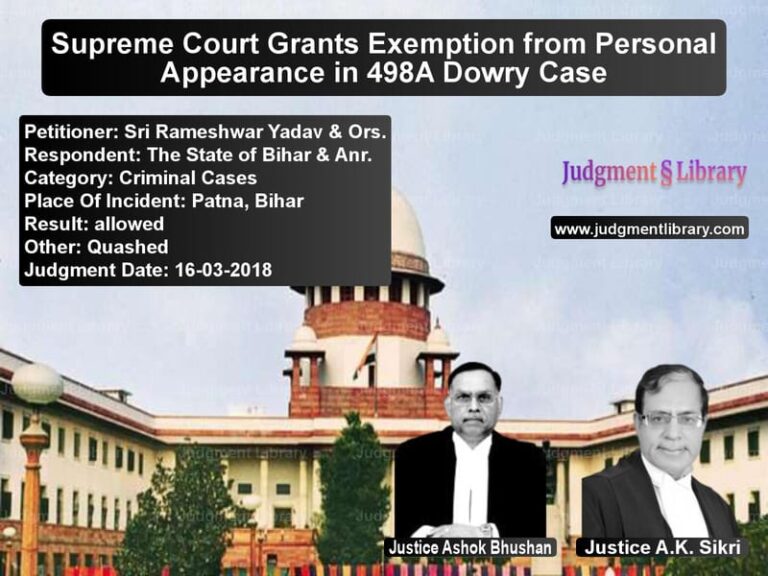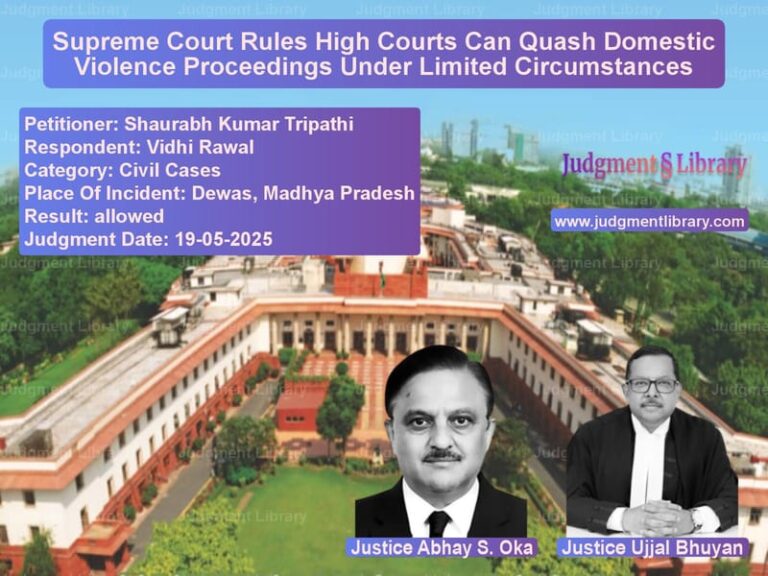Supreme Court Rules on Tax Deductibility of Levies on Kerala State Beverages Corporation
The case of Kerala State Beverages Manufacturing & Marketing Corporation Ltd. vs. The Assistant Commissioner of Income Tax is a landmark ruling by the Supreme Court concerning the interpretation of Section 40(a)(iib) of the Income-tax Act, 1961. The Court clarified whether certain levies paid by the Kerala State Beverages Corporation (KSBC), a state-owned entity, should be disallowed as deductions while computing taxable income. This judgment has significant implications for the taxation of government undertakings.
Background of the Case
The dispute arose when the Kerala State Beverages Manufacturing & Marketing Corporation Ltd. (KSBC), a state-owned enterprise engaged in wholesale and retail trade of alcoholic beverages, claimed deductions for certain statutory levies in its profit and loss account. The dispute pertained to the assessment years 2014-15 and 2015-16.
Key events in the case:
- The Deputy Commissioner of Income Tax, Thiruvananthapuram, finalized KSBC’s assessment for the year 2014-15 under Section 143(3) of the Income-tax Act, 1961.
- The Principal Commissioner of Income Tax revised the order under Section 263, holding that the assessment was erroneous as it failed to disallow debits related to surcharge on sales tax and turnover tax.
- For the assessment year 2015-16, the Assistant Commissioner of Income Tax disallowed Rs. 811.90 crore under Section 40(a)(iib), including gallonage fees, license fees, shop rental (kist), and surcharge on sales tax.
- KSBC challenged these disallowances before the Income Tax Appellate Tribunal (ITAT), which dismissed their appeals.
- The Kerala High Court partly ruled in favor of the revenue and partly in favor of KSBC, leading both parties to appeal to the Supreme Court.
Legal Issues Raised
- Whether gallonage fees, license fees, and shop rentals levied on KSBC qualify for disallowance under Section 40(a)(iib).
- Whether surcharge on sales tax and turnover tax fall within the purview of Section 40(a)(iib).
- Whether the provision was meant to prevent tax avoidance by state undertakings transferring their profits to state governments through levies.
Arguments of the Petitioner (KSBC)
KSBC, through legal counsel, presented the following arguments:
- Non-exclusivity of levies: KSBC contended that the levies were not exclusive to the corporation and applied to all license holders.
- Taxation of statutory dues: It argued that sales tax and surcharge were statutory obligations, not ‘fees’ or ‘charges’ subject to disallowance under Section 40(a)(iib).
- Revenue-neutrality: The disallowed deductions would result in double taxation as KSBC already transferred profits to the state exchequer.
Arguments of the Respondents (Income Tax Department)
The Income Tax Department countered the petitioner’s claims, stating:
- Exclusivity of levies: The department argued that KSBC was the exclusive licensee for wholesale liquor trade, making the levies exclusive and thus disallowable under Section 40(a)(iib).
- Preventing tax avoidance: It contended that the provision was introduced to prevent state governments from diverting taxable income through levies.
- Surcharge as an appropriation: The department maintained that surcharge on sales tax was an indirect method of state appropriation, making it ineligible for deduction.
Supreme Court’s Observations
The Supreme Court, comprising Justices R. Subhash Reddy and Hrishikesh Roy, made the following key observations:
- Gallonage fees, license fees, and shop rentals are disallowable: The Court upheld the High Court’s ruling that these levies were exclusive to KSBC and thus fell under Section 40(a)(iib).
- Surcharge on sales tax and turnover tax are deductible: The Court held that these are statutory taxes and do not qualify as fees or charges under Section 40(a)(iib), thus allowing their deduction.
- Purpose of Section 40(a)(iib): The provision was introduced to prevent state undertakings from evading taxes by transferring profits to the state treasury through fees and charges.
- Exclusive levies vs. general taxation: The Court distinguished between fees imposed exclusively on a state entity and general statutory taxes, clarifying that only the former falls under Section 40(a)(iib).
Final Judgment
The Supreme Court issued the following ruling:
“The appeal filed by the assessee is dismissed, and the civil appeals filed by the revenue are partly allowed. The assessments for the years 2014-15 and 2015-16 are set aside. The assessing officer shall pass revised orders in accordance with this judgment within two months.”
Implications of the Judgment
This ruling has several important implications:
- Clarity on Section 40(a)(iib): The judgment provides a clear interpretation of what qualifies as an exclusive levy under the provision.
- Tax treatment of government undertakings: The decision ensures that state-run businesses do not evade taxes by transferring income to state governments through levies.
- Distinction between taxes and fees: The Court reaffirmed that statutory taxes like sales tax and turnover tax are deductible, unlike exclusive fees imposed on state undertakings.
- Strengthened tax enforcement: The ruling strengthens the Income Tax Department’s ability to prevent revenue losses from state-controlled enterprises.
Conclusion
The Supreme Court’s decision in Kerala State Beverages Manufacturing & Marketing Corporation Ltd. vs. The Assistant Commissioner of Income Tax is a landmark ruling that clarifies the scope of tax deductions for state-owned enterprises. By distinguishing between general taxation and exclusive levies, the Court ensured that tax laws are applied fairly while preventing revenue diversion. This case serves as an important precedent for taxation of government undertakings across India.
Petitioner Name: Kerala State Beverages Manufacturing & Marketing Corporation Ltd..Respondent Name: The Assistant Commissioner of Income Tax.Judgment By: Justice R. Subhash Reddy, Justice Hrishikesh Roy.Place Of Incident: Kerala.Judgment Date: 03-01-2022.
Don’t miss out on the full details! Download the complete judgment in PDF format below and gain valuable insights instantly!
Download Judgment: kerala-state-beverag-vs-the-assistant-commis-supreme-court-of-india-judgment-dated-03-01-2022.pdf
Directly Download Judgment: Directly download this Judgment
See all petitions in Income Tax Disputes
See all petitions in Tax Refund Disputes
See all petitions in Banking Regulations
See all petitions in Judgment by R. Subhash Reddy
See all petitions in Judgment by Hrishikesh Roy
See all petitions in partially allowed
See all petitions in Remanded
See all petitions in supreme court of India judgments January 2022
See all petitions in 2022 judgments
See all posts in Taxation and Financial Cases Category
See all allowed petitions in Taxation and Financial Cases Category
See all Dismissed petitions in Taxation and Financial Cases Category
See all partially allowed petitions in Taxation and Financial Cases Category







